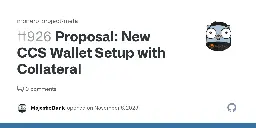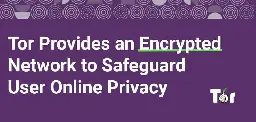For those who are still on Win 7: Firefox (and so Tor Browser) will stop supporting Win 7 soon. Seriously, you better plan to migrate to Linux. Not-so-good privacy issues aside, everyone knows Windows is not very secure/safe/convenient anyway.
Generally, votes are overrated. Especially if you’re not mainstream, by definition most people won’t support you, won’t agree with you, won’t understand you.
Some things may be downvoted because they’re too stupid. But occasionally, you might be downvoted simply because you’re a bit too early. Like, if you’d said “being gay is not crime” or something 50 years ago, you might have got downvoted… Just a thought.
Maybe what you’re thinking is like an XMR version of Bisq's “Get your first BTC” room?
https://bisq.wiki/Getting_your_first_BTC This dilemma is real and understandable, while it’s not clear what would be the best solution:
For new users, Bisq requires between 0.002 and 0.007 BTC for traders to make their first trade: [...] It can be difficult for new bitcoiners to acquire their first coins, so this requirement is often a barrier for new Bisq users. The Get your first BTC room offers one possible way to get this initial bitcoin without signing up for a centralized exchange.
Basically the same thing for Haveno, I guess.
Another bad experience related to Mastercard: https://monero.town/post/1791576
Cake Pay should be fine for most gift cards, I don’t think they usually ask for KYC for those.
So perhaps your recent bad experience with Mastercard EUR cards are rather exceptional?
Thanks for warning. Saw https://monero.town/post/872283 too. Guess Cake Pay may be convenient for those who are fine with KYC. Another option, that Stealths thing is more expensive (higher fees), so basically if you want to buy a gift card here or there, you’ll have to choose between (possible) KYC and higher fees. Or so it seems…
According to @azalty@monero.town, Cake Pay works fine if you’re fine with KYC, and otherwise you may just lose your money: https://monero.town/post/872283
If you’re a privacy advocate not fully supporting KYC but want to try this anyway, then try a small amount, because you may lose all your money. Another recent option is more privacy-friendly and KYC-free, but the fees are higher with them.
We know the ability to get Monero will not be essentially affected—after all, this is not the first time, nor the second time, when Monero is delisted. It seems reasonable to admit, though, that ultimately the ability/freedom to spend Monero might be limited if legit (e.g. hosting) companies can’t accept it in the future—directly or indirectly because of MiCA etc. Although, what will happen in such a situation may be seen as an interesting experiment.
Since the posted link is not very Tor-friendly behind CF, similar random links just in case…
- OKX exchange delists privacy coins, including Monero, Dash, and Zcash https://www.cryptopolitan.com/okx-delists-privacy-coins-monero-dash-zcash/
Following the announcement, privacy tokens such as Dash (DASH), Monero (XMR), and Zcash (ZEC) witnessed a notable decline of up to 10%
- Important OKX Delisting Announcement Concerning Large Subset of Altcoins https://cryptopotato.com/important-okx-delisting-announcement-conrcening-large-subset-of-altcoins/
The prices of some of these tokens have headed south shortly after the announcement. XMR is down nearly 3% in the past 24 hours, while ZEC has plunged by 10%
- Crypto Exchange OKX All Set to Delist Privacy Coins https://thenewscrypto.com/crypto-exchange-okx-all-set-to-delist-privacy-coins/
- Zcash and Monero on the chopping block for delisting https://www.cryptopolitan.com/naira-is-about-to-have-its-worst-year-ever/
The concept may be lovely, but the fact is, many people nowadays have been Pavlov’ed to immediately ignore anything weird that says, "Congratulations! You got some money. Visit this URL and input something." As they say, the Cake is a lie…
Monero could be a wonderful gift to a friend of yours if they’re especially interested in privacy (in that case, you might want to talk to them privately, and perhaps recommend a better wallet). Otherwise, it may be kind of like casting pearls before swine…
You can now buy access to Binance s law enforcement request panel for 10 000 in bitcoin or monero according to a post on black hat hacking discussion site Breach Forums As reported by CoinDesk darknet publication InfoStealers

>“Some Hackers have figured out there is no quick and easy way for a company that receives one of these EDRs (emergency data request) to know whether it is legitimate,” he said. > >“The hackers will send a fake emergency data request along with an attestation that innocent people will likely suffer greatly or die unless the requested data is provided immediately.”
Trocador shows it explicitly whether a specific CEX is no-log or requiting IP logging, which you can choose. This new thing doesn’t have TOS nor Privacy Policy to begin with. Yet as long as you use onion, logging by the front-end is rather irrelevant.
Even if the front-end is not logging anything (which no one can verify), a CEX behind it surely records the tx and retains it as required by laws (some of them might be less than perfectly legal and might not record anything, though that would mean a different kind of risk). Using a CEX is more or less risky, be it Trocador or something else. Some may think that an instant swap by CEX is convenient. Personally I prefer DEX, even though it may be less convenient, even though Monero.town itself has an official affiliate link to Trocador too.
Asia might potentially be a better idea (not Japan or Korea though)
You mean, like Hong Kong, or India, maybe? What do you mean by “not Japan or Korea though”? I’d feel China would be worse. Privacy-focused services tend to be pricey anyway, both in Europe and in the US, and the price comparison is tricky as EUR/USD can move weirdly. If you’re talking about Njalla (Sweden), it’s indeed rather expensive.
Although France seems to be generally anti-cryptography, of course you wouldn’t go to jail just because you use Tails. There was this notorious incident related to French activists & Proton, though. Also, the Netherlands can be scary. They arrested a developer of Tornado Cash, right? Although, those things have nothing to do with VPS!
Thank you so much! These minor details are really helpful :D Happy holidays!
It’s true that the EU is getting “difficult”. Ironically, the US (without GDPR) can be better, where the right to anonymous speech is more or less protected (although, of course, US hosting companies in general are not good for that).
IncogNet is a good example, where you can get a domain anonymously, just like from Njalla but the price being much affordable. Not only that, they’ll set up an onion/I2P version for your website for free. (This is not a recommendation, though. DYOR.)
Floki was once famous but, yeah… they’re getting a bit less popular now after the Covid things. It’s not Iceland and Seychelles based; basically it’s a German company, having servers in Iceland, Finland, Romania, and the Netherlands. Iceland was once very popular, but anymore. Using a .is domain now assuming it’s “safer” is a bit yesterday.
Especially, be aware of France: they’re like “you use encryption because you have something to hide, doing something bad.” Also, you might want to avoid EU domains (.fr etc.) in general: check about NIS2, so called “Thick Whois“ to see what this means. For example, you can’t get a .nl anonymous domain anymore (a recent change); a similar trend being expected soon in other EU registrars/resellers i.e. “domain KYC”.
PS: Incognet is based on Fran's (Frantech/BuyVM) in Canada, which has been generally trusted and has some good track record. One might want to consider BuyVM etc. too (Not a recommendation, DYOR).
PPS: Incognet accepts xmr, but you can’t do crypto-related things like mining on their servers. A negative point for some of us.
Exactly how does you activate it? Ordering itself is kyc-free (and even Tor-friendly?) but you’ll need to show your IP to activate it, of course?
@stealths@monero.town Thanks for clarification!
- For example, a user in China can buy a card from you, redeem (activate) it and use it internationally, except they can’t use it in shopping at an online shop China?
- A user in Pakistan can not activate it and use it at all, though others can use it for shopping internationally incl. at at online shop in Pakistan.
It that what this means? I assume activation then includes GeoIP? I’m very happy that a few user reviews are positive anyway. You know, some “services/companies” advertising here tend to be a bit sketchy or iffy. Your prepaid card business seems a honest one, at least now! Thanks for joining monero.town :) I hope this can be convenient & fruitful for both users and you 🐱
Visa International (Just fyi): The supported country list by Stealths and the similar list by Tremendous are slightly different. The differences (if real) might be mostly relevant to Chinese users.
These three are included in Stealths’ list, but not included in Tremendous’ list:
China, Hong Kong (*Taiwan is in both lists), Swaziland
These countries/areas are not inluded in S’s list, but are included in T’s list:
Bosnia and Herzegovina, Burundi, Congo (*Flag of Congo-Brazzaville is shown), Eswatini, Pakistan, Panama, Saint Helena, Saint Pierre and Miquelon
When trying to swap something to XMR (esp. a large amount? or at a small CEX?), it seems that there is always a possibility that the CEX (which may claim you can swap any amount) may not actually have enough XMR.
(They might be offering to sell Monero, when they don’t have enough.)
PS. Historically there are a few warnings: https://metager.de/meta/meta.ger3?eingabe=Exolix Monero
You clearly said: “Unlike others exchange aggregator Intercambio is created by Trusted Monero Community members” — implying yours is better, more trusted than Trocador.
If you’re “friendly”, you can ask, “I don’t understand what you mean. Could you explain?“ — Saying “Yes theres uBlock, and ?” doesn’t sound too friendly, not willing to learn new things. It’s irrelevant whether you personally dislike me or not; what you do is honest and good, your business might be successful. We’ll see.
See also: https://monero.town/post/942859 How to sell $300k+ Monero without origin of funds?
@heikomat@lemmy.world If you’re still interested, now the recommendation is, that “in” is bigger: https://monero.town/post/1163754
Explore our in-depth critique of FinCEN's policy proposal FINCEN-2023-0016, examining its potential overreach on freedoms. Learn how it may violate Fourth Amendment protections, free speech, financial privacy, due process, and more. Discover our insights on the implications for individual rights and

How FinCEN May Be Violating Your Rights\ A call to action against FINCEN proposal 2023-0016A\ Written By Preston Pysh
>Eroding Anonymity Through Additional Verification: The mandate for “Additional Customer Identity Verification Measures for Transactions Involving Unhosted Wallets” is a direct affront to privacy and anonymity. This requirement transgresses on the First Amendment’s sanctuary for anonymous speech > >A Direct Assault on Anonymity-Enhanced Currencies: The “Prohibition on the Use of Anonymity-Enhanced Convertible Virtual Currencies (AECVC)” is nothing short of a legislative bulldozer through the edifice of privacy.
See also: Preston Pysh says proposed FinCEN crypto rules violate US Constitution
EDIT: Don’t take this too seriously; do not actually send a donation (unless you really want to, like admiring “Nice photoshopping!” “Thanks for the fun pic”). While it’s entertaining and thought-provoking, using their work this way is ethically questionable too. As @z0rg0n pointed out, one could even see this as a scam. Although it’s a fine work and freedom of expression is more important, this may more properly belong to “Memes”. *** EDIT2: This post and “cool if real” by @alphonse https://monero.town/post/1122495 were created almost at the same time. That was a coincidental post conflict; @alphonse’s post was actually earlier by about 1 hour! *** Is someone crowdfunding a Monero ad in India’s economic newspaper? > Interestingly, a Monero ad could be circulating in India’s traditional English newspaper: The Economic Times. The pseudonymous Stoic, author of “The Monero Standard,” shared a picture of the newspaper’s November 16th edition. In the picture, it is possible to see the paper’s opened front page with a large ad about XMR. > >> “Monero transactions respect your privacy. Can you say that about the INDIAN RUPEE or the U.S. DOLLAR?” > > Moreover, the image also includes a QR-Code for donations in “XMR only,” which suggests its owner is expecting to crowdfund what was spent for this supposed insertion.
Changpeng Zhao (CZ), the founder and CEO of Binance, the world's largest cryptocurrency exchange, stated in his statement that the executives of a client company they worked with were

> the onchain activities of the attackers were monitored and […] action was taken to freeze the wallets held by the attackers by working with other cryptocurrency exchanges
> a member of the cryptocurrency community questioned how Binance could freeze these funds despite the fact that cryptocurrencies are marketed as not being confiscable by third parties
> Changpeng Zhao […] said that the whole thing is a matter of balance. […] CZ implied that a solution to events such as theft cannot be found in a system that cannot be completely frozen.
> CZ stated that if users use privacy coins such as Monero (XMR), such freezes will not occur, but the stolen funds cannot be returned.
Cf.
- Almost entire balance (2675 XMR) of Community Crowdfunding System (CCS) Monero wallet has been stolen https://monero.town/post/983106
- Monero Project admits thieves stole 6-figure sum from a wallet in mystery breach https://monero.town/post/1045387
PS. See also: Bitcoin can be traced, If you use XMR, then there isn’t much anyone can do https://monero.town/post/1069626
As the crypto space continues to evolve, regulatory scrutiny is shifting towards privacy coins, with authorities wary of their misuse in activities such as money laundering.

> regulatory scrutiny is shifting towards privacy coins […] Understanding how they will be implemented in systems that are decentralized, where the developers and maintainers often maintain anonymity, is complex.
E.g. Bisq, Haveno
> compliance with these regulations becomes a paradox for such projects since the crux of privacy coins lies in their ability to mask transaction details, which inherently contradicts the essence of regulations […] Therefore, achieving full regulatory compliance for privacy coins may sometimes seem impossible. […] in the UK, the Financial Conduct Authority (FCA) has been proactive in educating consumers about the risks associated with privacy coins but has not implemented bans or specific regulations concerning them.
> in the United States, proposed legislation such as the STABLE Act could further extend the regulatory framework […] it’s plausible that the provisions of the STABLE Act […] could potentially mean that transactions involving privacy coins would need some form of identity verification
> A prime example of a regulatory shift impacting privacy coins is the European Union’s Fifth Anti-Money Laundering Directive (5AMLD) […] these platforms are now obliged to implement customer due diligence measures, […] verifying user identities and monitoring transactions for any signs of activity.
Potentially:
- Alice (unhosted wallet) sends coins to Bob (CEX) -> Alice is also KYCed by the CEX
- Alice (CEX) sends coins to Bob (unhosted) -> Bob is KYCed too
> Monero Project admits thieves stole 6-figure sum from a wallet in mystery breach
https://lemmy.world/post/7993453 i.e. https://monero.town/post/1045387
While there are typical comments like crypto=scam “You have to be quite stupid to support crypto in 2023”, there are also replies like these (with which more people seem to agree, unexpectedly): >It’s designed to protect anyone using it - even attackers. >That’s the price to pay for having privacy. >The alternative is an Orwellian dystopia.
>If you’re going to use Luna, FTX, and NFTs as arguments about something like Monero, […] you probably don’t really understand any of them.
It’s a bit odd that such a discussion is more active on a different Lemmy instance than here, but it’s interesting to hear honest opinions of various people about the incident, about Monero. Maybe your views are different from them, from mine. For example, one person states there that while they know exactly what Monaro is, they’re still skeptical.
Starting any related write-up without considering how much Monero Core did for this project. Not just stewards, but role-models, crypto heroes and people who devoted their time, expertise and nerve...

>Collateral wallet is 2-3 multi-signature wallet but it doesn't have to be Monero. Bitcoin multi-signature is much more tested and very ease to use using Electrum or similar.
>Option two on this topic would be to use Monero multi-signature to keep Collateral.
Somewhat curious, though not like using xmr speculatively.
- 2023-11-02T15:57 CCS Wallet Incident · Issue #916 · monero-project/meta · GitHub
- 2023-11-04T00:39 [Moonstone Research] Postmortem of Monero CCS Hack: A Transaction Graph Analysis (Dated Nov 03)
- 2023-11-05T07:20 [One of the earliest media reports] Monerujo Wallet User Drains Monero’s CCS Wallet: Report - Coin Edition
Some of the media reports are negatively confusing, like saying the Monero network is defective. Date-Time in UTC.
Edit: Moonstone Research -> 2023-11-04T00:39 was based on the server response headers (last-modified). Apparently the blog post was created about 1 hour earlier (the link was posted on Github at 2023-11-03 23:50).
The Community Crowdfunding System (CCS) in Monero provides financial backing for members' development initiatives. Read the following crypto news to know more.

Nothing really new for us. Just one of the earliest media reports for the record.
Edit (2023-11-06): Apparently, one of the earliest reports about the incident by general (“outside”) media is, Monerujo Wallet User Drains Monero’s CCS Wallet: Report [blocking Tor: archive.org], at 2023-11-05T07:20+00:00.
It’s interesting to see how general people are looking at this, and relatedly how they are thinking about Monero, although generally what’s written there is nothing new nor helpful for us (often disturbingly inaccurate even). For this reason I posted a few random links to related articles. You can add more and comment on it, if there are anything interesting or especially stupid 😖
1 Privacy coins prioritize user anonymity and financial freedom. 2 Advanced cryptography techniques bolster transaction security. 3 Regulatory challenges

> While privacy coins promise enhanced anonymity and financial freedom, they also pose challenges […] they often face heightened regulatory scrutiny, with some governments banning or heavily regulating their use.
> the very feature that makes them attractive – their privacy – can also be their Achilles’ heel. […] This dual-edged sword might deter potential new adopters and pose reputational risks for those involved in legitimate uses of privacy coins.
> Cryptocurrency privacy is vital for ensuring personal liberty and maintaining fungibility, becoming even more crucial as surveillance and data collection grow. […] a balance of innovative privacy technologies and thoughtful regulation is essential
We all know this; not easy.
Defend yourself against tracking and surveillance. Circumvent censorship.

Windows user who'd like to try Tor + wallet etc.: if this is your first time, it may take like 10-20 minutes, but everything is easy.
Although there may be a easier shortcut (see below), the regular way is like this:
- Go to https://www.torproject.org/download/tor/ and get a "Tor Expert Bundle" (get one that says 64 if your CPU is 64-bit). To open this ".tar.gz" file, you may need a tool like 7-zip. (*1)
- Open (decompress) it to get a .tar; open (untar) this .tar, and you'll see two folders ("data" and "tor") there. Copy these 2 folders (with everything inside them) to a new folder, created wherever you like.
- Open the "tor" folder, and double click on tor.exe. If asked, allow it to run and allow it to make remote connections. A text-based window (console) appears with status messages (read them to see if it's working). That's it. You're now running your own copy of Tor.
Once this is ready, you can optionally Tor-ify any tool that supports proxy (Socks5) server. Go to the "Network" or "Proxy" settings of the tool (e.g. Monero Official GUI), and input the proxy server address "127.0.0.1" (without quotes), port number "9050", and if necessary, select the type of your proxy, "Socks5". Your login name and password (if asked) can be empty or anything random (*2).
(*1) Technically, you're supposed to verify a PGP sig here. For now, let's say if you download a file from (archive.)torproject.org, it should be safe.
(*2) Similarly, you can Tor-ify other tools, e.g. a chat tool, a BitTorrent client. A regular browser can be also Tor-ified but that's a bit tricky and usually unnecessary: for web browsing, using Tor Browser is a good idea.
Official GUI vs. Feather (about Tor)
- Official GUI: Tor is not used by default. You'll have to do manual settings and run your own copy of Tor, like above.
- Feather: Tor is used automatically. That's easy. However, according to the docs, Tor is NOT ALWAYS used by default, unless you select "Always over Tor" or you're on Tails, etc. Another potential problem of Feather is, if you automatically use Tor coming with Feather, you might be stuck with an old version of Tor. This is because Tor tends to be updated more often than Feather. A solution is…
The same page states: > Feather releases are bundled with a Tor binary. If the presence of a local Tor daemon on the default port (9050) is not detected, Feather will place the bundled Tor binary in the config folder and run it on port 19450.
This should mean, if Tor is already listening to 9050, then Feather will just use it. So, if you'd like to: Feather + Latest version of Tor = also easy (just like Official GUI + Tor).
Elsewhere I saw some kind of confusion like "Feather does everything via Tor, yet it's fast" "Since Feather does everything via Tor, don't use it on Tails, which is already on Tor" etc. etc. and felt that this should be clarified and the fact should be shared. This confusion about Tails is kind of understandable, though.
A possible shortcut: If you already have Tor Browser, and if you start it, Tor Browser's Tor is listening to 9150 (I think). Thus you should be able to do wallet etc. + Tor 9150 (instead of 9050), if you don't mind always opening Tor Browser. This might feel easier…
The French government is considering a law that would require web browsers – like Mozilla's Firefox – to block websites chosen by the government.

> In a well-intentioned yet dangerous move to fight online fraud, France is on the verge of forcing browsers to create a dystopian technical capability. Article 6 (para II and III) of the SREN [sécuriser et réguler l'espace numérique] Bill would force browser providers to create the means to mandatorily block websites present on a government provided list.
[Unfortunately one should no longer trust Mozilla itself as much as one did 10 years ago. If you do sign, you might want to use a fake name and a disposable email address.]
This bill is obviously disturbing. It could be that eventually they assume that .onion sites are all suspicious and block them, or something similar might happen, which would be bad news for privacy-oriented users including Monero users, for freedom of thought, and for freedom of speech itself. Note that the EU is going to ban anonymous domains too (in NIS2, Article 28).
For a regular end user, if something like this happens and if the block is domain-name-based, then one quick workaround would be using web.archive.org (or Wayback Classic), or ANONYM ÖFFNEN of metager.de (both work without JS). If this is France-specific, of course a French user could just get a clean browser from a free country too (perhaps LibreWolf or Tor Browser, or even Tails), provided that using a non-government-approved browser is not outlawed.
Mozilla, financially supported by Google, states that Google Safe Browsing is a better solution than SREN, but that too has essentially similar problems and privacy implications; especially Gmail's Enhanced Safe Browsing is yet another real-time tracking (although, those who are using Gmail have no privacy to begin with, anyway).
If it's DNS-level blocking, you can just use a better DNS rather than one provided by your local ISP, or perhaps just use Tor Browser. Even if it's browser-side, as long as it's open-source, technically you're free to modify source code and re-compile it yourself, but that may not be easy even for a programmer, since a browser is complicated, with a lot of dependencies; security- and cryptography-related minor details tend to be extremely subtle (just because it compiles doesn't mean it's safe to use), especially given that Firefox/Thunderbird themselves really love to phone home behind the user's back.
See also: Will Browsers Be Required By Law To Stop You From Visiting Infringing Sites?
> Having free and open-source tools and a decentralized way of fighting back and reclaiming some of that power is very important. Because if we don’t resist, we’re subject to what somebody else does to us
While Tor is useful in several situations, probably we shouldn't believe in it blindly. For clearnet, LibreWolf is a great option too, and I2P might be the future.
The U.K. Parliament is pushing ahead with a sprawling internet regulation bill that will, among other things, undermine the privacy of people around the world. The Online Safety Bill, now at the final stage before passage in the House of Lords, gives the British government the ability to force backd...

>The Online Safety Bill, now at the final stage before passage in the House of Lords, gives the British government the ability to force backdoors into messaging services, which will destroy end-to-end encryption.
>Requiring government-approved software in peoples’ messaging services is an awful precedent. If the Online Safety Bill becomes British law, the damage it causes won’t stop at the borders of the U.K.
Random thoughts...
Even if platform-assisted end-to-end encryption (pseudo e2e) is censored, perhaps we could still use true user-to-user encryption. If "end" means the messenger software itself or a platform endpoint, then the following will be true e2e - "pre-end" to "post-end" encryption:
- Alice and Bob exchange their public keys. While using a secure channel for this is ideal, a monitored channel (e.g. a normal message app) is okay too for the time being.
- Alice prepares her plain text message locally: Alice.txt
- She does gpg -sea -r Bob -o ascii.txt Alice.txt
- Alice opens ascii.txt, pastes the ascii string in it to her messenger, sends it to Bob like normally.
- So Bob gets this ascii-armored GPG message, and saves it as ascii.txt
- gpg -d -o Alice.txt ascii.txt, and he has the original Alice.txt
- He types his reply locally (not directly on the messenger): Bob.txt
- gpg -sea -r Alice -o ascii.txt Bob.txt and sends back the new ascii string
- Alice gets it, so she does gpg -d -o Bob.txt ascii.txt to read Bob.txt
In theory, scanning by government-approved software can't detect anything here: Alice and Bob are simply exchanging harmless ascii strings. Binary files like photos can be ascii-armored too.
Admittedly this will be inconvenient, as you'll have to call gpg manually by yourself. But this way you don't need to trust government-approved software at all, because encryption/decryption will be done by yourself, before and after the ascii string goes through the insecure (monitored) channel.
> Congress is trying to push through a swarm of harmful internet bills that would severely impact human rights, expand surveillance, and enable censorship on the internet. On July 20, we’re launching a week of action to get loud about our opposition to legislation like KOSA and EARN IT and demanding that Congress focus on passing badly needed comprehensive privacy legislation to actually protect us from the harms of big tech companies and data brokers, instead of pushing through misguided legislation before August congressional recess.
Sometimes you have to ask the question whether something should be done at all, and trusted computing is certainly one of those cases where the answer is obviously a big fat NO. So please reconside...

Can someone explain what this does using only two words?
>google extortion
>more ads
>surveillance capitalism
See also: Web Environment Integrity API Proposal | Hacker News
New to Lemmy. A privacy advocate. Interested in number theory.



